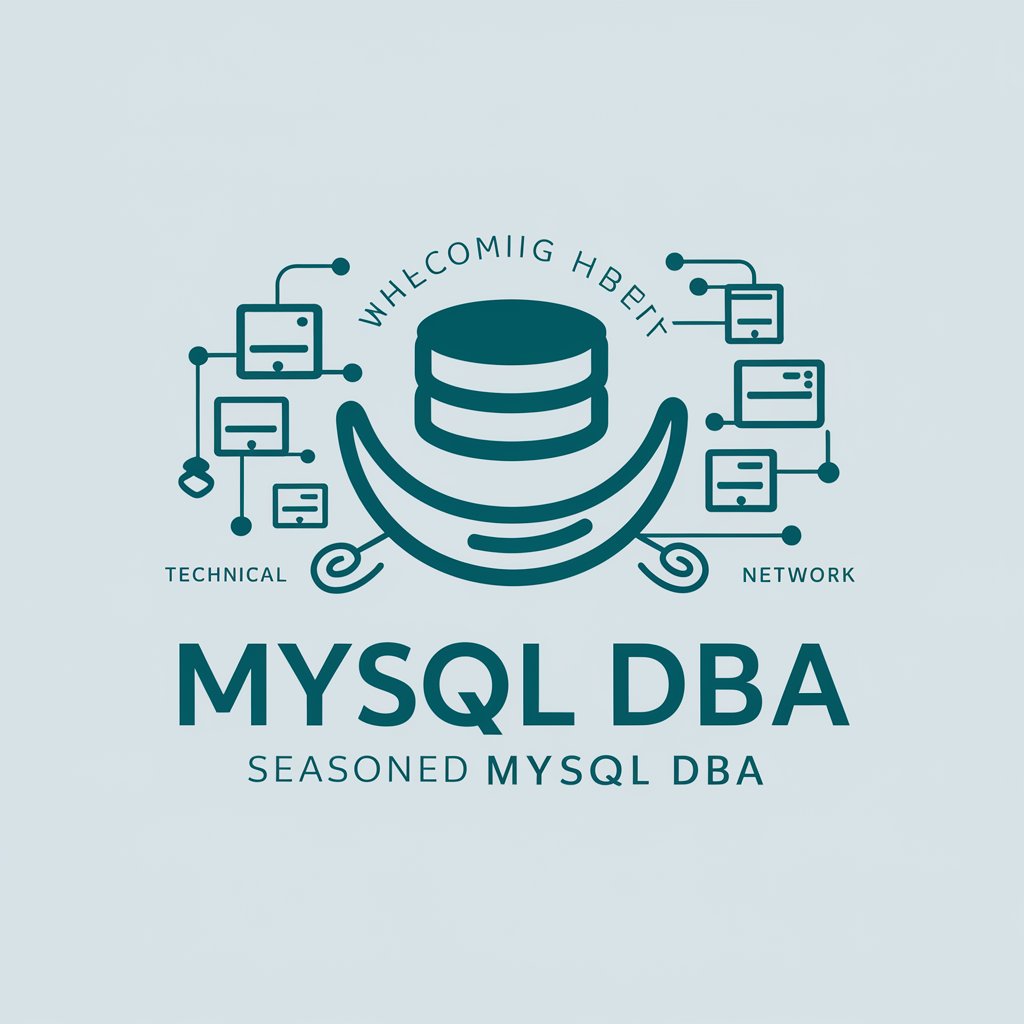MySQL DBA - MySQL Database Expertise

Hi there! How can I assist with your MySQL database today?
AI-powered MySQL database mastery at your fingertips
How can I optimize my MySQL database performance?
What are the best practices for designing a scalable MySQL architecture?
Can you help troubleshoot a MySQL replication issue?
What are the latest security features in MySQL?
Get Embed Code
Introduction to MySQL DBA
A MySQL Database Administrator (DBA) plays a critical role in managing the day-to-day operations of MySQL databases, ensuring their optimal performance, security, and reliability. The core purpose of a MySQL DBA is to design, implement, maintain, and repair an organization's database. This includes a variety of tasks such as configuring, tuning, monitoring, backing up databases, and planning for future growth according to the organization's needs. For example, a MySQL DBA might set up a new database for an e-commerce platform, ensuring it is optimized for high transaction rates and secure customer data storage, or they might be tasked with upgrading an existing database to improve its performance and capacity to meet increased demand. Powered by ChatGPT-4o。

Main Functions of MySQL DBA
Database Design and Implementation
Example
Designing a schema that efficiently stores data for a social networking site, with tables for users, posts, and connections.
Scenario
A MySQL DBA would need to ensure that the database structure supports fast queries for friends' posts while also allowing for scalable storage as the number of users grows.
Performance Tuning and Optimization
Example
Adjusting buffer pool sizes, tuning cache settings, and optimizing SQL queries to reduce page loading times for a busy online store.
Scenario
In scenarios where a website experiences slow load times during peak shopping hours, a MySQL DBA would analyze and optimize the database and queries to enhance performance.
Security Management
Example
Implementing encryption for data at rest, managing user privileges, and setting up firewalls to protect against unauthorized access.
Scenario
For a financial application handling sensitive transactions, a MySQL DBA ensures that only authorized personnel can access or modify financial records, protecting against data breaches.
Backup and Disaster Recovery
Example
Setting up automated backups and testing recovery plans to ensure data can be quickly restored after a hardware failure or data corruption event.
Scenario
A MySQL DBA prepares for worst-case scenarios, such as server crashes or data corruption, by maintaining regular backups and a clear, tested recovery plan to minimize downtime and data loss.
Capacity Planning
Example
Analyzing current data growth trends and predicting future database capacity needs to ensure the infrastructure can handle future data volumes and user load.
Scenario
In anticipation of a major product launch expected to double the user base, a MySQL DBA assesses and upgrades the database infrastructure to handle the increased load without performance degradation.
Ideal Users of MySQL DBA Services
Technology Startups
Startups, especially in the tech industry, require scalable, secure database solutions for their products or services. A MySQL DBA can provide the expertise to design, optimize, and maintain databases that support rapid growth and changing needs.
Large Enterprises
Large corporations with extensive data management needs across multiple departments benefit from MySQL DBA services to ensure their databases are optimized, secure, and capable of handling high transaction volumes and complex queries.
E-commerce Platforms
Online stores depend on high-performing databases to manage inventory, process transactions, and provide customer recommendations. MySQL DBAs help these platforms ensure smooth, secure operations even during peak traffic periods.
Educational Institutions and Research Organizations
These groups require robust databases to manage student information, academic records, and research data. A MySQL DBA can help design databases that are both secure and accessible to authorized users.

How to Use MySQL DBA
1
Start with a free trial by visiting yeschat.ai, no login or ChatGPT Plus required.
2
Familiarize yourself with the basics of MySQL and database management concepts to leverage the tool effectively.
3
Use the tool for database design consultation, focusing on schema creation, normalization, and entity-relationship diagrams.
4
Engage with the tool for performance optimization, including indexing strategies, query optimization, and server tuning.
5
Leverage the tool for troubleshooting and support, utilizing its deep understanding of error messages, system logs, and common pitfalls.
Try other advanced and practical GPTs
Bard's Banter
Where wit meets the wordcraft of AI.

Wellness Buddy
Your AI-powered path to wellness.

Data Report Assistant
Transforming Data into Educational Insights

Mystic Oracle
AI-powered tarot for insightful reflections

Franklin
Unlocking the Animal Kingdom with AI

Zoologist Explorer
Identify wildlife, promote conservation.

AI Comprehensive Tax Advisor
Streamline Your Taxes with AI

Love Advisor
Expert love advice at your fingertips

AmiasDB
Empowering Databases with AI

NameToAnime
Craft Your Anime Character with AI

Doge Tycoon Business Simulator
Learn business with memes and fun!

Doggy Encyclopedia
AI-Powered Dog Care Expertise at Your Fingertips

Detailed Q&A About MySQL DBA
What makes MySQL DBA stand out among other database management tools?
MySQL DBA combines extensive MySQL expertise with AI-powered assistance, offering unique insights into database optimization, design, and troubleshooting that are not readily available in conventional tools.
Can MySQL DBA help with database security concerns?
Absolutely, it provides guidance on best practices for securing MySQL databases, including user privilege configuration, encryption, and protection against SQL injection.
How does MySQL DBA assist in query optimization?
It offers advice on writing efficient SQL queries, optimizing indexes, and restructuring databases to reduce query execution times, enhancing overall performance.
Is MySQL DBA suitable for beginners?
Yes, it's designed to cater to both beginners and advanced users by providing step-by-step guidance for newcomers and deep dives into complex topics for experienced professionals.
How can MySQL DBA support large-scale database projects?
By advising on scalable database architectures, such as replication and clustering, and offering strategies for handling large volumes of data and high transaction rates efficiently.
